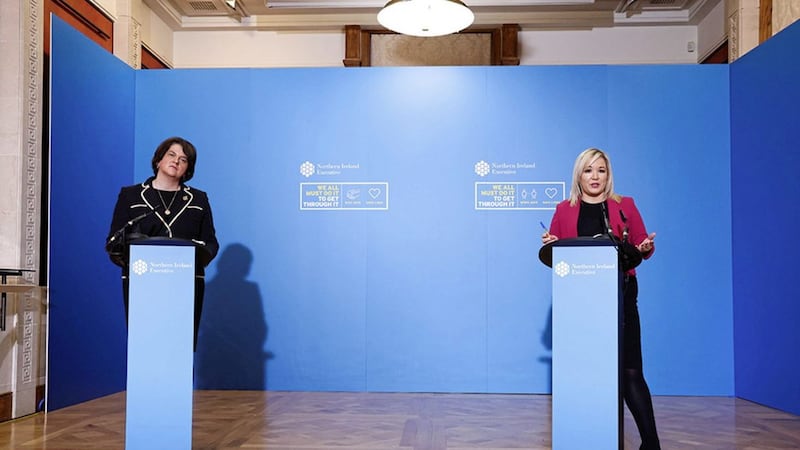Speaking to Enda McClafferty, the BBC's political editor, Arlene Foster claimed the lack of dates and certainties in the executive's Pathway Out of Restrictions document wasn't a recipe for chaos.
Yet when DUP MP Carla Lockhart dismissed the document as being 'clear as mud' Foster said she was perfectly entitled to that opinion because had the executive been composed entirely of DUP members the document would have been very different.
So, why the mixed messaging? Why defend the document and then defend the person rubbishing the document (although that may be something to do with the fact that Foster is so weak, so lacking in authority as DUP leader, that she isn't strong enough to say boo to my cat, let alone to one of her MPs).
Mixed messaging always has a number of consequences and in this case it undermines the document itself, as well as blowing a hole in the image that the executive might actually have been speaking with one voice on this occasion. And when the people at whom the document is directed - us, in other words - spot disagreement, then it's hardly surprising when pessimism and restlessness sets in.
The other thing I don't understand is why the executive didn't vote on the document. I know they think that claiming it had unanimous support, so didn't require a vote, might make people think it was a collectively endorsed strategy, but they must have known the cracks would appear within hours. Which they did. You only had to listen to the responses of Foster and Michelle O'Neill on Wednesday morning to know they were poles apart on key issues. So why not just admit it?
If you are opting for the no-vote-required unanimity approach to something then it is essential that you speak with one voice and one message when a camera or microphone pops up beside you. And if someone from your own party is brutally critical then you have to be seen to put them in their place and defend the document you have nodded through. How can Foster even attempt to defend it now, when every journalist will ask her how representative Lockhart's view is across the party? How can the other parties in the executive (some of whose representatives have been bending my ear about the 'usual problems with the DUP') not have known that the cracks would appear so quickly?
So why not take a vote? Surely the electorate is entitled to know precisely where the parties stand on such a crucial strategy: a strategy, moreover, that will affect the lives of every single person in Northern Ireland. Why insult our intelligence with the nonsense of not thinking a vote is necessary when every single member of the executive knew there were serious fault lines? More important, those fault lines will still be there when the reviews take place later this month and then again in the middle of April, and will fundamentally compromise any possibility of a serious debate about the latest available data.
And did they really think that something as fatuous as 'data driven rather than date driven' would fool us into believing they were all thinking the same way? Or that, come April 15 (yes, they were capable of picking dates, after all), there would be a miraculous meeting of minds on the latest data that would enable them to provide specific dates for opening. Of course they didn't. But they have such contempt for us - and I do mean all of them - they'd rather pretend to be unanimous than face up to the fact they aren't and then have to deal with the consequences of that truth.
Votes matter. They provide a record of how our government conducts its business and responds to crises and critically important decisions. At a moment like this I would like to know exactly what the various parties believe and how they think we should move forward. I'm sick to death of representatives/supporters of other executive parties trotting out the line, 'everybody knows there is only one problem party,' yet failing to accept criticism of themselves for not forcing a vote so that it's a matter of public record who did and didn't support a strategy.
If the DUP (or anyone else) vote against something, they are entitled to criticise it. If the executive refuses to enforce collective responsibility, parties can do what they like. If votes aren't forced then none of them can complain if cracks appear afterwards. If they pretend unanimity when there isn't any, they do a disservice to all of us. The DUP does what it does, but let's stop the pretence that the other parties aren't complicit.








